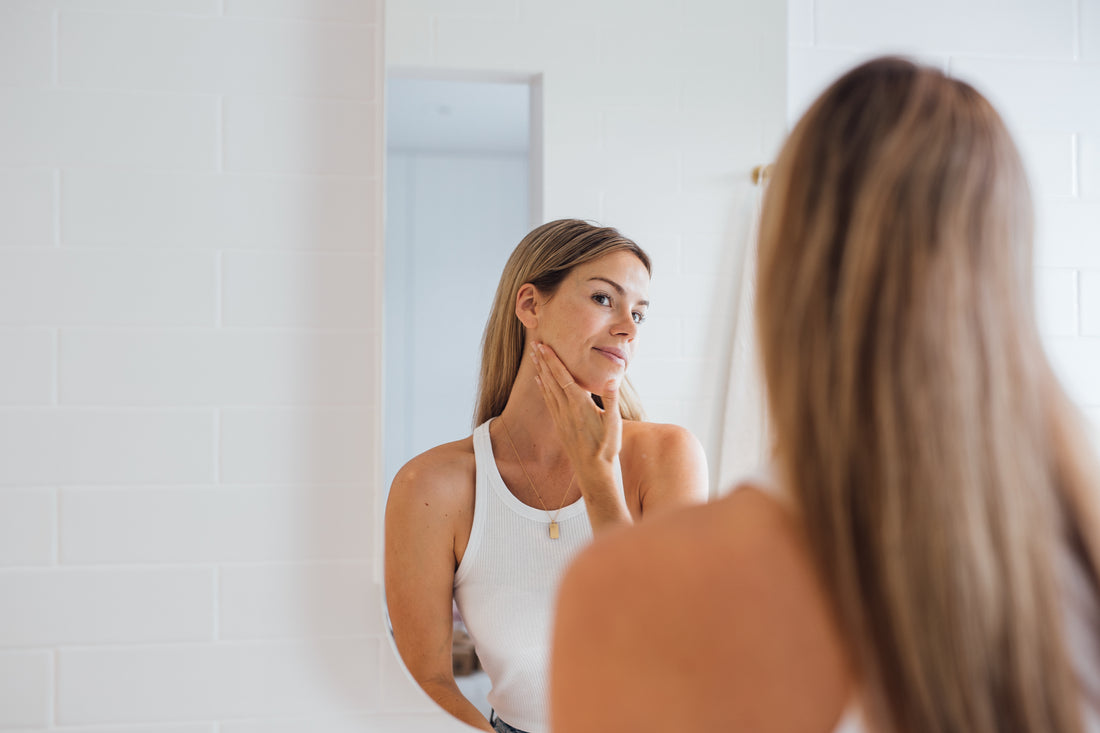
How skin cell turnover changes as you age
Share
Ageing is something we would all like to avoid – a fact which is SUPER evident by how much money Australians spend on skincare each year, a WHOPPING $2.9 billion (and growing) each year.
Whilst we haven’t yet discovered a miracle fountain of youth, we have learnt a lot about skin, what affects skin and what we can do to slow or minimise the ageing process.
Understanding the ageing process.
Ageing is a totally natural process, and its speed is dependent on both internal & external factors. Internally, ageing is influenced by genetics, a factor that we have no control over. Externally, ageing is influenced by our environment and how we interact with it (think sun damage & wind damage, stress factors, if we exercise or not, smoking, alcohol etc).
When we break this down into the processes the skin goes through to renew itself, heal & retain its youthful glow, we talk a lot in skincare about skin cell turnover. It is useful to understand what this is.
In broad terms, cell turnover is the term used to describe the skin’s process of constantly shedding dead skin cells and replacing them with newer / younger cells.
During this process, cells move upwards from the dermis (the deepest layer of the skin), then to the basal layer (and finally to the epidermis (the layer exposed to air & environmental factors). Along the way, a complex network of fatty acids, lipids, protective pH & triglycerides are created that collectively work to protect the skin.
This process is never ending but begins to slow more & more as we age. Collagen & elastic levels begin to deplete, and the skin becomes less efficient at removing the free radicals both created by the cell turnover process and encountered environmentally.
How cell turnover slows as we age.
You may have marvelled at the softness and brightness of a baby’s skin and that is because they are cell turnover powerhouses! As a guide, this is how long it takes for the cell turnover process in different age groups.
- Babies – 14 days.
- Teenagers – 14-21 days.
- 20’s – 21-28 days.
- 30’s – 28-35 days.
- 40’s – 30-45 days.
- 50’s – 45-55 days.
- 60’s – 60 days or more.
How can we influence cell turnover?
Whilst we can’t prevent time from ticking over, the good news is there are things we can do to help our skin and speed up cell turnover including:
Exfoliation:
As cell turnover slows, your skin will experience a build-up of dead skin cells on the surface. Exfoliation is a key factor in boosting cell turnover as it removes those dead skin cells, encouraging the generation of new cells.
This doesn’t mean however that you should exfoliate daily – this could lead to acne, irritation, and slower cell turnover as you strip the skin of its natural oils. Instead, once, or twice a week is enough.
Nourishment & Hydration:
A balanced & nourishing moisturising regimen goes a long way to assisting the skin’s cell turnover process as a healthy skin barrier will function better than one that is damaged and playing catch-up.
This means keeping your skin well hydrated with a moisturiser that matches your skin’s needs but also feeding it with antioxidants like Vitamin C, B, E, A, K, Essential Fatty Acids and more. The healthier your skin is, the better it will operate.
Retinol:
Retinol is gaining more and more traction as the gold standard in assisting / speeding up cell turnover as it encourages the progression of new cells from the base layer of the skin to the surface to happen faster by reaching deeply enough to stimulate collagen & elastin fibres.
Some things to note when adding a retinol into your routine:
- They can be triggering for sensitive skin (so patch test and be aware of any other ingredients within the retinol that may trigger your skin).
- They make your skin more sensitive to the sun, so staying out of the sun or liberally using sunscreen is a must.
Eating Well:
With more and more science emerging about the link between gut health & the health of your skin, it stands to reason that the healthier you eat, the better your skin can operate. Eating vitamin rich foods & a balanced diet gives your skin the ingredients it needs to effectively turn over cells.
Sunscreen!
We’ve said it many times, if you do nothing else for your skin, make sure you use a sunscreen every day. Sunscreen is VITAL to protecting all layers of your skin, allowing them to function efficiently and preventing sometimes irreversible damage that leads to the early signs of ageing.
